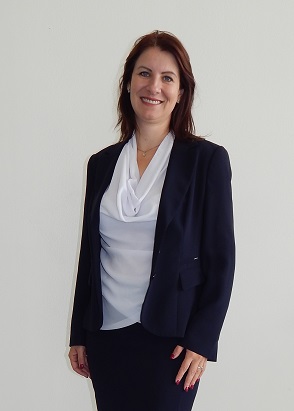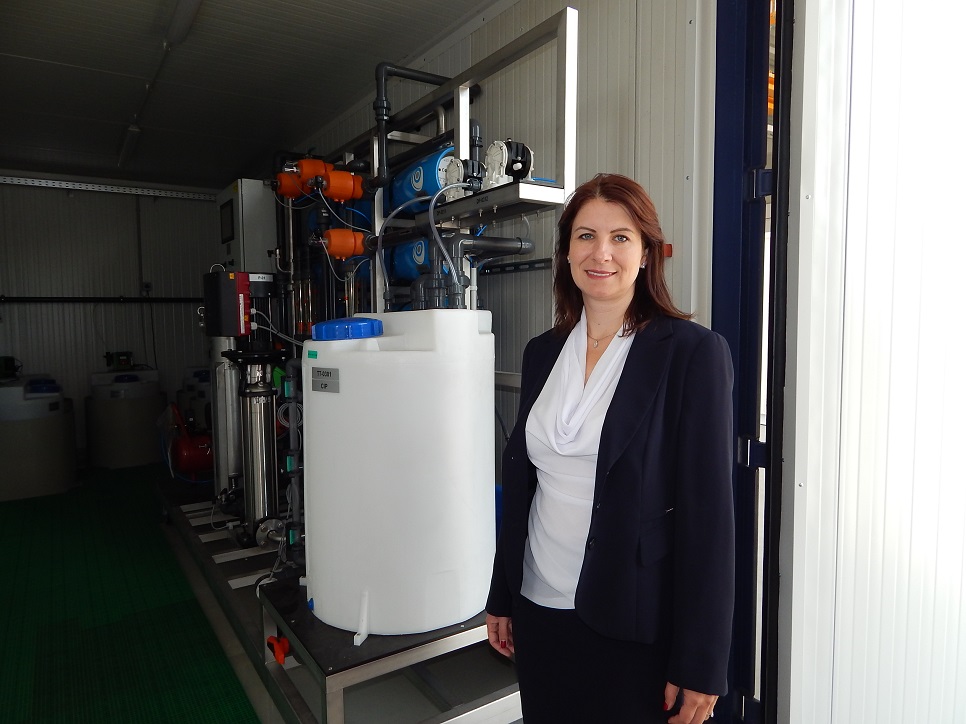
Krisztina Borsos, managing director of Hidrofilt Ltd.
The call for proposals “Support of business RDI activities (VÁLLALATI KFI_16)” fosters the in-house development of new, marketable products, services and technologies with significant intellectual added value by knowledge-intensive, innovative businesses. Under the scheme, micro, small and medium size enterprises and large companies in Central Hungary may apply independently or in consortium for HUF 80 to 500 million in funding for their RDI activities that fit in with one of the sectoral priorities identified in the National Smart Specialisation Strategy.
Hidrofilt Kft. was established in Nagykanizsa 28 years ago, in 1990. The founders had picked up their professional skills at Nagykanizsai Finommechanikai Vállalat, a former state-owned company. Hidrofilt Kft. is engaged in the design, manufacturing, servicing, maintenance and, in certain cases, operation of water treatment systems. Their clients are mainly power plants, pharmaceutical companies, oil and chemical industry companies, as well as public utilities, however there is also a rising need for adequate water treatment in agriculture. Today their units and services are not only used in Hungary but also in many other countries all over the world (e.g.: Sri Lanka, Mexico and the United Arab Emirates).
Hidrofilt Kft. was established and developed from almost scratch at the time of the change of regime by Hungarian experts adept in water treatment. And we have worked our way up to being a company with an annual turnover of four billion HUF and employing more than a hundred employees. Hidrofilt has subsidiaries in Poland, Slovakia and Romania boosting the Hungarian export, introduces Krisztina Borsos, Managing Director of Hidrofilt Kft. the history of the company. Our clients include prestigious companies such as MOL, MVM Paks, Richter, Dreher, GE, Mercedes, Givaudan, but the residents of Zalaegerszeg and Miskolc also benefit from the healthy drinking water purified with ultrafilters installed by us. Our core activities involve the design and installation of water treatment systems relying on membrane technology. Technological water frequently has a high salt content blocking or spoiling equipment. Our industrial clients endeavour to operate their technological process efficiently and in a reliable manner on the long run. We can provide them with the desalinated water they need through water treatment systems using membrane technology.
One of the key elements of the company’s profile is the technology relying on reverse osmosis. This technology has become one of the most popular forms of water treatment as, owing to its efficiency, it does not represent such a high environmental load as formerly developed technologies. These units are used at many places in the pharmaceutical industry, energetics, the chemical, semiconductor and automotive industries.
By now, reverse osmosis has become one of the most versatile processes in water treatment, said Krisztina Borsos answering our question. Osmosis is not simply a filtration process as, contrary to classical ways of filtration, it is not about separating a liquid and its dissolved solid content but a part of the solvents goes through the membrane leaving a more concentrated solution on the other end of the membrane.
To have a clear understanding of the mechanism of osmosis, we should say a few words about “ordinary” osmosis. This latter occurs extremely frequently in nature (for example water flow through the membrane of plant cells relies also on this process). It is based on the notion that if two solutions of different concentration are separated by a semipermeable membrane (i.e. not all the components of a solution can permeate it), then the solvent molecules flow from the less towards the more concentrated side. In other words, the system shifts towards a concentration balance. In reverse osmosis, as its name suggests, the process is reversed. If pressure is applied to the more concentrated solution (e.g. water of high salt content), the solvent will pass through the semipermeable membrane in the direction of the less concentrated solution. This way, the semipermeable membrane can be used for separating the dissolved substance and the solvent.
Reverse osmosis-based units are high efficiency water filters with their key component being a membrane. These membranes are made of a laser-perforated plastic foil that is wrapped around a perforated tube. Such membrane parts are installed in the membrane house where the raw water puts them under high, 10-25 bar pressure. The pore size of the membranes is so small that almost only water particles can flow through them. Therefore, on one side of the membrane clear water, while on the other, water with high pollutant and mineral salt concentration leave the membrane.
The operational reliability and lifespan of units relying on reverse osmosis are, however, dependent on two major aspects. Namely, the pre-treatment of raw water, on the one hand and the regular inspections and maintenance works, on the other. The objectives of Hidrofilt Kft.’s winning project are to extend the lifespan of industrial reverse osmosis units through a new, adaptive and smart maintenance technology and to develop a technology-based SMART product module that can be manufactured in a cost-efficient way. If needed, based on the data recorded and their evaluation, the module performs maintenance with automated chemical selection or informs the operating staff. The SMART module helps in extending the lifespan of the expensive membrane elements and reducing the amount of operating chemicals used, thus cleaning and repair processes accompanied by unwanted outages can be prevented.
Owing to the developments made in the project, Hidrofilt Kft.’s clients will be able to monitor, based on real time data, the condition of the membranes in their units and will be promptly informed if there is a need for intervention. What is more, certain technological interventions will be performed automatically by SMART control. With this, operations will become more predictable, reliable and cost efficient and the lifespan of the units and the membranes will considerably increase.







